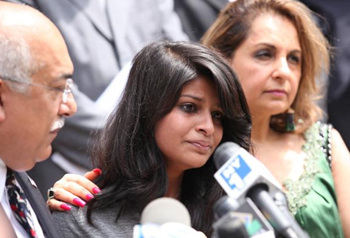New York, Sep 18: In a significant legal victory for the daughter of an Indian diplomat, the city of New York has agreed to pay her USD 225,000 to settle a lawsuit she brought against it after she was jailed for a day and suspended from school on suspicion of sending obscene emails to her teacher.
 Krittika Biswas has in turn agreed to dismiss all the claims against the city, Board of Education and the officials of the New York Police Department who had arrested and detained her in 2011.
Krittika Biswas has in turn agreed to dismiss all the claims against the city, Board of Education and the officials of the New York Police Department who had arrested and detained her in 2011.
US District Judge John Koeltl in the Southern District of New York said in his order that the City of New York agrees to pay Biswas USD 225,000 in "full satisfaction of all claims" and in consideration for the payment Biswas "agrees to dismissal of all the claims" against the defendants.
He said that the parties in the case "desire to resolve the issues" raised in the litigation "without further proceedings and without admitting any fault or liability."
Biswas's lawyer Ravi Batra said in a statement to PTI that the "honour" of Biswas, Indian diplomats and India has been has been "vindicated" with the court order.
The settlement acknowledged that Biswas was an "honor student" at the time of her "false arrest."
He said Biswas joins him in "thanking" the Indian- American community, former ambassadors Prabhu Dayal and Meera Shanker and her former classmates and teachers whose "emotional and moral support" helped her in her legal fight.
Biswas had filed the lawsuit seeking USD 1.5 million in damages for her wrongful imprisonment and suspension from school. She was detained and arrested in February 2011 on the grounds that she had sent "offensive and sexually threatening" emails to her teachers in Queens's John Browne High School.Biswas is now in India.
The defendants had moved to "dismiss" the entire lawsuit but an appeals court had last month refused to throw out the lawsuit saying the arguments by them were "without merit."
Biswas's lawsuit had detailed the circumstances that led to her being handcuffed and imprisoned forcibly approximately 28 hours "for nothing."
Biswas was "forced to be processed through the criminal justice system, and spent over 24 hours in jail without being allowed to meet her parents or visited by senior Indian diplomats. All of this occurred, despite her actual innocence as this was a case of mistaken identity."
It states that she was discriminated against and falsely accused of sending offensive e-mails because of her ethnicity.
An investigation after her arrest had found that another student had sent the emails but that student was not arrested or criminally charged, which Batra said is "proof of foul discriminatory disparate treatment" of Biswas "despite her actual innocence."
Citing the India-US relations, particularly in the wake of the upcoming visit of Prime Minister Narendra Modi, Batra said he advised Biswas and her family that a "just resolution" of the case would be an appropriate move to "enhance the bilateral relationship."





Comments
Add new comment